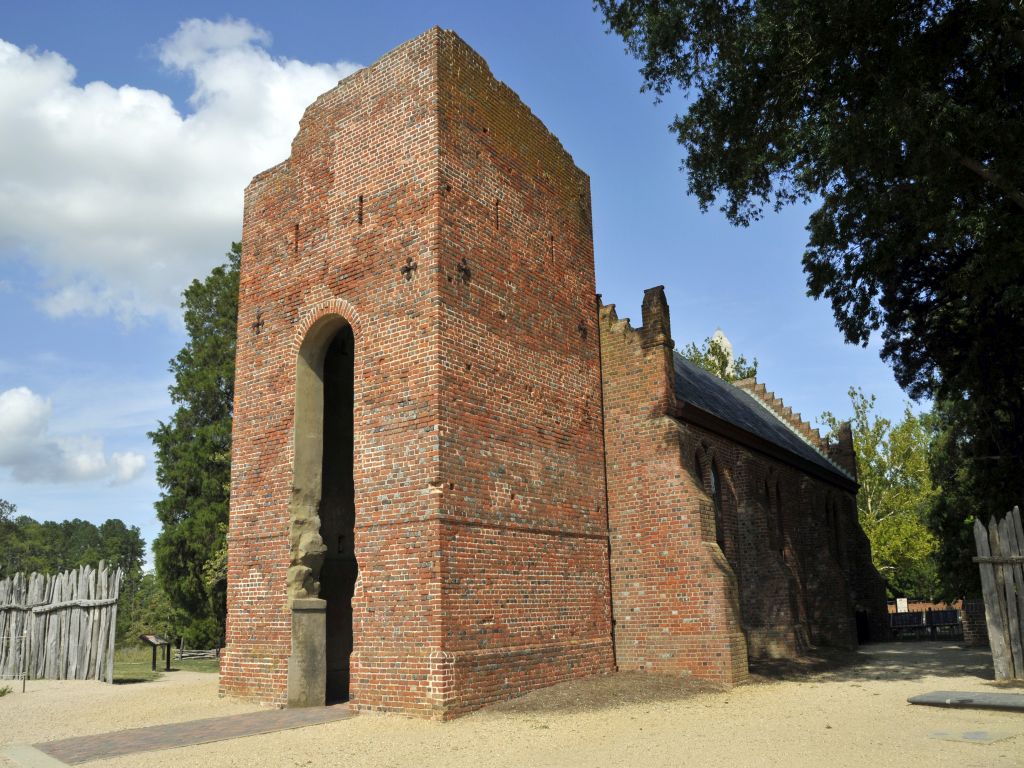The first votes of the fledgling Virginia Assembly in 1619 marked the inception of the most important political development in American history — the rise of democracy.
-
Winter 2020
Volume64Issue1
Editor's Note: Historian James Horn, a frequent contributor to American Heritage, is President of the Jamestown Rediscovery Foundation. Portions of this essay appeared in his recent book, 1619: Jamestown and the Forging of American Democracy (Basic Books).
Convened with little fanfare or formality, the first gathering of a representative governing body anywhere in the Americas — the General Assembly of Virginia — met from July 30 to August 4, 1619 in the choir of the newly built church at Jamestown. Following instructions from the the colony’s financial backers, Virginia Company of London, the meeting’s principal purpose was to introduce “just Laws for the happy guiding and governing of the people.” The assembly sat as a single body and was made up of the governor, Sir George Yeardley, his four councilors, and twenty-two burgesses chosen by the free, white, male inhabitants of every town, corporation, and large plantation throughout the colony.
No one in Virginia then or in the years following could have possibly grasped the importance of what had occurred. Settlers understood that the assembly allowed them to have a hand in governing themselves, but they were motivated more by opportunities to approve laws sent by the Virginia Company from London and to propose their own legislation rather than by abstract concepts of self-government or subjects’ rights and liberties.

Owing to numerous setbacks, the colony had struggled after its founding in 1607, leading the Company to introduce wholesale reforms in an effort to save it from collapse. Instigated by the highly respected parliamentarian and leader of the Virginia Company, Sir Edwin Sandys (pronounced Sands), propertied white males in the colony were granted remarkable political freedoms as well as opportunities to share in the running of their own affairs. In addition, plans were put in place to promote a harmonious society where diverse peoples and religious groups would live together side by side in peace to their mutual benefit.
Because so many influential parliamentary leaders were involved with the Company, proposals for Virginia were informed by the wide-ranging political debates taking place simultaneously at James I’s court and in Parliament, which linked developments in the fledgling colony to domestic and international issues of momentous consequence. By 1619, the Virginia Company was recognized by many in high political circles as a laboratory for some of the most advanced constitutional thinking of the age.
Company leaders grounded their efforts to establish a godly and equitable society in the philosophical theory of the commonwealth. The term commonwealth, or the “common weal,” emerged in Europe in the late fifteenth and sixteenth centuries and brought together a variety of political and economic precepts that highlighted the common good of the people. Particular emphasis was given to the importance of wise and noble rulers and mixed government — a salutary balance of monarchy, aristocracy, and democracy — as well as Christian morality, prosperity, and social well-being. Linked to Renaissance humanist ideas, statesmen and intellectuals believed that the application of rational approaches to government and social and economic organization would encourage the improvement of societies and the human condition. Where better to test these ideals than the New World?
In Virginia, commonwealth theory guided the leadership’s approach to every facet of the emerging colony, including government, the rule of law, protections for private property, the organization of the local economy, and relations with the Powhatans, the Indian peoples whose territories surrounded English settlements. The great reforms introduced in 1619, therefore, were all-encompassing, not directed simply toward the creation of a legislative body.

The Company’s commonwealth project was also condemned by critics for being dangerously egalitarian. Captain John Bargrave, a prominent merchant-planter, wrote forcefully that the “mouth of equal liberty must needs be stopped,” denouncing what he saw as the overt populist tendencies among Company leaders, including Sandys. “Extreme liberty,” he warned, was more perilous to the political and social order than “extreme tyranny.”
Political leadership, lauded among the responsible, propertied classes, was not deemed suitable for the poor and landless who comprised the vast majority of people in early modern society. It was axiomatic among the upper classes that poor people’s lack of independence, property, and education disqualified them from prominent roles in society. In Virginia, where poor workers made up a far higher percentage of the total population than in England, political power rapidly became concentrated in the hands of small groups of wealthy planters who, largely autonomous in their own localities and insulated from close oversight by English government officials three and a half thousand miles away, became accustomed to a freedom of action unthinkable at home.
A few weeks after the first meeting of the Assembly, a battered English privateer, the White Lion, entered the Chesapeake Bay and anchored off Point Comfort, a small but thriving maritime community at the mouth of the James River that was the Colony’s first port of call for oceangoing ships. While roving in the Caribbean, the ship had been in a fierce battle with a Portuguese slaver bound for Veracruz. Victorious, it sailed away carrying dozens of enslaved Africans and, running short of water and provisions, headed for Virginia. A couple of weeks later planter John Rolfe reported that the White Lion had “brought not anything but 20. and odd Negroes,” who were “bought” (my italics) for food supplies. Forcibly transported from West Central Africa (modern-day Angola), they were the first Africans to arrive in mainland English America.
The coincidence of the meeting of the first representative government and arrival of the first enslaved Africans in the summer of 1619 was portentous. Historians have argued that the rise of liberty and equality in America, America’s democratic experiment, was shadowed from its beginning by its dark obverse: slavery and racism. Slavery in the midst of freedom, Edmund Morgan writes, was the central paradox of the birth of America. The rapid expansion of opportunities for Europeans was made possible only by the enslavement and exploitation of African and Indian peoples. Non-Europeans were consigned to a permanent underclass excluded from the benefits of white society, while Europeans profited enormously from the fruits of the labors of those they oppressed.
No documented discussion took place in the colony about the morality of owning and enslaving Africans. Deliberations in future general assemblies at Jamestown, as mirrored later in colonial legislatures across English America, focused far more on policing measures against Africans and protecting the rights of masters than on the rights of the enslaved or ethical considerations. Slavery, African and Indian, together with a broad spectrum of white non-freedom — apprenticeships, convict labor, and serfdom — were simply taken for granted in the emerging Atlantic world of the time and elicited little comment.
Thus, 1619 marks the inception of the most important political development in American history, the rise of democracy, as well as the emergence of what would in time become one of the nation’s greatest challenges: the corrosive legacy of racial stereotypes that continues to afflict our society today.
What began at Jamestown during those torrid few days of summer would have momentous consequences. Shortly before he died on July 4, 1826, Thomas Jefferson composed one of his greatest tributes to liberty in a last letter to posterity. Referring to the still novel American form of government, he wrote, “May it be to the world, what I believe it will be (to some parts sooner, to others later, but finally to all), the signal of arousing men to burst the chains under which monkish ignorance and superstition had persuaded them to bind themselves, and to assume the blessings and security of self-government.” By “the grace of God,” Jefferson concluded, “these are grounds of hope for others,” and, he might have added, for us. The felicity of self-government and its benefits were held out to future generations of peoples around the globe.
In fact, the spread of self-government had begun long before. Originating in the English parliaments of the early seventeenth century, the principle that a just government relied on the consent of the governed and the rule of law applied to everyone irrespective of social status was transferred to Virginia as part of the Company’s sweeping reforms of 1619.
Every subsequent British American colony established its own representative assembly and judicial system that would secure and protect settlers’ lives, liberties, and properties. From colonial New England to the West Indies, historian Jack P. Greene comments, America proved to be “an extraordinarily fertile ground for parliamentary governance.”
By the time of the American Revolution, most colonies had enjoyed self-government for more than a century and were able to translate their governing institutions into republican forms relatively easily; the habit of self-rule and exercise of extensive fiscal and lawmaking powers had been the norm for so long. A deeply ingrained sense of independence on the part of wealthy elites at colony and state levels emerged early and became the basis for the growth of powerful local political institutions modulated by their own regional cultures.
Colonial and then state legislatures developed as the bedrock of the American political system, a finely tuned balance of local and central powers that gave expression to and celebrated citizens’ collective rights and liberties. Today, these freedoms, together with the federal and state constitutions that enshrine them, constitute the foundational principles of American democracy.
Sir Edwin Sandys believed passionately that the creation of a commonwealth was the best means of establishing just laws and a fair and equitable society in America. In November 1622, the poet and dean of Paul’s Church, John Donne, preached movingly to leaders of the Company, “Those amongst you that are old now, shall pass out of this world with this great comfort, that you contributed to the beginning of that Common Wealth” in Virginia. Sandys’s dream of creating a commonwealth in the interests of settlers and Indians proved short-lived.
But the twin pillars of democracy — the rule of law and representative government — survived and flourished. It was his greatest legacy to America.

